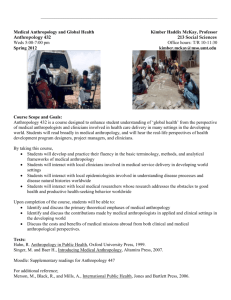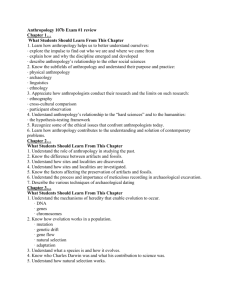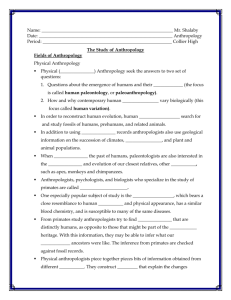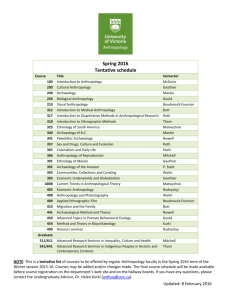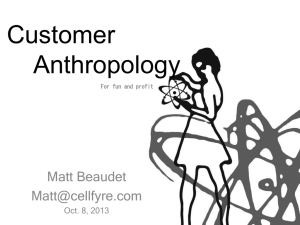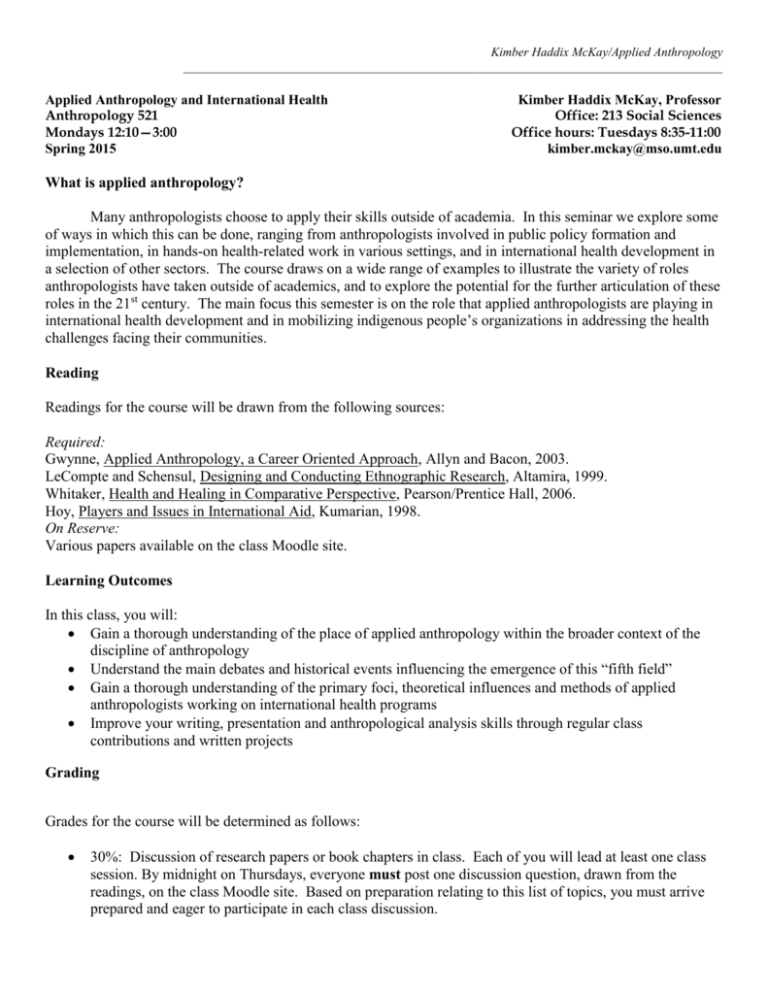
Kimber Haddix McKay/Applied Anthropology
______________________________________________________________________________________
Applied Anthropology and International Health
Anthropology 521
Mondays 12:10—3:00
Spring 2015
Kimber Haddix McKay, Professor
Office: 213 Social Sciences
Office hours: Tuesdays 8:35-11:00
kimber.mckay@mso.umt.edu
What is applied anthropology?
Many anthropologists choose to apply their skills outside of academia. In this seminar we explore some
of ways in which this can be done, ranging from anthropologists involved in public policy formation and
implementation, in hands-on health-related work in various settings, and in international health development in
a selection of other sectors. The course draws on a wide range of examples to illustrate the variety of roles
anthropologists have taken outside of academics, and to explore the potential for the further articulation of these
roles in the 21st century. The main focus this semester is on the role that applied anthropologists are playing in
international health development and in mobilizing indigenous people’s organizations in addressing the health
challenges facing their communities.
Reading
Readings for the course will be drawn from the following sources:
Required:
Gwynne, Applied Anthropology, a Career Oriented Approach, Allyn and Bacon, 2003.
LeCompte and Schensul, Designing and Conducting Ethnographic Research, Altamira, 1999.
Whitaker, Health and Healing in Comparative Perspective, Pearson/Prentice Hall, 2006.
Hoy, Players and Issues in International Aid, Kumarian, 1998.
On Reserve:
Various papers available on the class Moodle site.
Learning Outcomes
In this class, you will:
Gain a thorough understanding of the place of applied anthropology within the broader context of the
discipline of anthropology
Understand the main debates and historical events influencing the emergence of this “fifth field”
Gain a thorough understanding of the primary foci, theoretical influences and methods of applied
anthropologists working on international health programs
Improve your writing, presentation and anthropological analysis skills through regular class
contributions and written projects
Grading
Grades for the course will be determined as follows:
30%: Discussion of research papers or book chapters in class. Each of you will lead at least one class
session. By midnight on Thursdays, everyone must post one discussion question, drawn from the
readings, on the class Moodle site. Based on preparation relating to this list of topics, you must arrive
prepared and eager to participate in each class discussion.
Kimber Haddix McKay/Applied Anthropology
______________________________________________________________________________________
20%: Formal, thought-provoking presentation of one short outside reading that you select on a (related)
topic of your choice. This presentation must include handouts and a Powerpoint presentation to
summarize main points, present graphical information to be explained, etc., and should last about 30
minutes.
50%: Term Paper (description below).
The paper will be preceded by a descriptive abstract, due on April 6th
Attendance: Each unexcused absence will reduce your cumulative score by 5 points.
Schedule:
Week of:
Topic:
What to Read:
January 26
Introductions,
description of course,
charting the semester
None
February 2
Why not just work in
academics? How to
evaluate options open
to you as an
anthropologist
Gwynne Chpt 1 & 13
Moodle: Chambers 1987
History of applied
anthropology and
development
Gwynne Chpt 3
February 9
February 16
President’s Day
February
23
Ethics in applied
anthropology,
continued: Informed
consent
Notes/Visitors:
Enrichment:
Discussion leader:
Bennett 1996
(supplemental)
Enrichment:
Discussion leader:
Moodle:
Escobar 1990
Gardner and Lewis 1996
LeCompte and Schensul
Chpts 3-6 and Chpt 9
AAA ethics
SFAA ethics
Enrichment:
Discussion leader:
Guest: UM IRB representative
Come prepared with questions for
the IRB staff member.
You MUST complete the IRB
training program on their website
before class!
March 2
Ethical issues in
applied anthropology:
Conflict zones
Gwynne Chpt 4
Moodle:
Solovey 2001
Enrichment:
Discussion leader:
Kimber Haddix McKay/Applied Anthropology
______________________________________________________________________________________
Porter 2007
March 9
Anthropologists and
the rise of NGOs:
Roles and ethics
Gwynne Chpt 6
Hoy Chpts 1-95
Enrichment:
Discussion leader:
March 16
Anthropology and
‘local development’ –
who wants
‘development’, how
do they get it, and
what happens next…
Gwynne Chpt 5
Hoy Chpt 5
Enrichment:
Discussion leader:
March 23
Moodle:
Colson 1956
Peters, 1996
Mehta, 1996
Anthropology and
Gwynne Chpt 10
‘local development’ – Hoy Chpt 6
helping project
managers understand
Moodle: Rogers 1995
why people sometimes
resist innovation
March 30
Spring Break
April 6
Anthropology and
health development
Gwynne Chpts 11 & 12
Whitaker Chpts 6 & 7
Enrichment:
Discussion leader:
Guest: Catherine Sanders
Enrichment:
Discussion leader:
The abstract for your term project is
due in class this week.
April 13
Anthropological
understandings of
‘folk medicine’;
communicating across
paradigmatic divides
Whitaker: 26 & 32
Enrichment:
Discussion leader:
April 20
The roles occupied by
traditional healers
Whitaker Chpts 8 & 9
Moodle:
Fissel & Haddix McKay
2004
Dow 1986
Greene 1998
Enrichment:
Discussion leader:
Kimber Haddix McKay/Applied Anthropology
______________________________________________________________________________________
April 27
Social scientists,
climate change and
health
Hahn Chpt 3
LeCompte and Schensul
Chpts 1-2
Enrichment:
Discussion leader:
Moodle:
Epstein 2001
McMichael 2006
May 4
Review of analyses of
the field, of the course,
and presentations of
your paper topics
Final Exam Period
Monday 1:10pm
Meet to turn in final projects Papers are due
Paper Assignment:
This assignment will require to you read the case studies in Whitaker carefully and critically. In your paper,
you’ll include two sections, as follows: (1) Describe two cases that demonstrate the use of anthropology in
international health; (2) Describe two cases that show us an analysis of the anthropology of an international
health problem.
Your paper will summarize the key themes and findings of the cases, and your own analysis will explain what it
is about these cases that exemplifies what medical anthropology offers the scholarly and applied communities.
Your analysis should highlight both the strengths and deficiencies of each of the four case studies.
Please prepare and submit the abstract for this project in class on April 6th. The paper may be submitted any
time thereafter up until the final exam period for the class.


